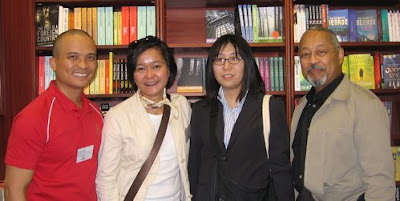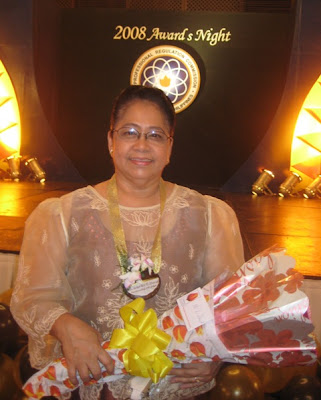If a student raises her hand in a class on Philippine literature and says, "Hindi ko maintindihan ang Tagalog" (I can't understand the Tagalog), should the teacher say, "Eh kasi tanga ka" (That's because you're stupid)? Well, this was essentially what happened when blogger-columnist Connie Veneracion complained that she and her husband, who were in fact trying to help their daughter, couldn't understand the Tagalog used in Mga Ibong Mandaragit by Amado Hernandez.
Exie Abola, another blogger-columnist, pointed out that Veneracion's attitude toward literature was unfortunate because she is "an adult, not a seventeen-year-old, and a parent at that." Other writers and bloggers would not be as restrained in their responses. Ibong Mandaragit dot com, a website dedicated to understanding the book was set up, but it seems its owner hasn't gotten past the first chapter. As far as I can tell, the "debate" degenerated into an unhealthy my-argument-is-better-than-yours, you're-so-stupid, one-sided "contest" that has all but obscured the important-but-apparently-not-important-enough-to-ask-their-opinion protagonists: the readers.
It's important to remember that this debate is not about Veneracion. She is not the enemy. She is a reading advocate (see her posts on "reading") who is making a complaint about the Tagalog used in Philippine literature. Maybe she's arrogant, maybe she generalizes too much, maybe her arguments don't make sense. But the way I see it, she is a customer providing feedback. In a previous life, I learned that "a complaint is a gift" and "don't shoot the messenger." And so, as my contribution to this blogosphere "controversy," I analyzed the search results on Google Blog Search for the term "ibong mandaragit" last 25 May 2008 to see what bloggers had actually written about the book since the beginning of the year.
Unfortunately, I did not bring the papers on which I jotted down the numbers, so I'll have to share the stats when I get back to Toronto from Vancouver, but out of the 97 hits, only very few—not counting those who were reacting to Veneracion—wrote about the book in a significant way. Below are all of those that indicated whether they dis/liked the book or found its language difficult to read. It certainly seems as if Veneracion was not merely speaking for herself. Maybe some researcher will see this and think of doing a more in-depth study, instead of relying on the reactions of the literati to Veneracion's complaint.
Laraxe super inaalagaan ko yung books ko, any book (except yung mga walang kwenta talaga like mga ibong mandaragit).
AlexAt my last day, teacher Mayet said that I could borrow the book entitled, mga ibong mandaragit at the library. I was required to read it. It was like summer class, but harder. I was given 3 weeks, and all I could read was 10 chapters. I'm not a fast reader, especially in filipino, in english, I'm okay... The book was really hard to understand, and the words are very deep, that I needed a tagalog dictionary all the time.
Chocolateisblisshow fast can you read a book? or better yet how fast can you read a chapter or even a page of my all time favorite book Mga Ibong Mandaragit?
DexterIf the Filipino really loved his own language he'd actually enjoy reading the Noli, or Mga Ibong Mandaragit. Hell, I have. But he can't even muster enough willpower to do that-- ask any high school kid.
TsinaHalos buong high school life ko sinasabi ko sa sarili ko kaya ko yan, dahil kung hindi ko kinaya siguradong wala na ako ngayon at malamang eh tinali ko na ang sarili kong patiwarik sa isang punong matanda. [Haha! Mga Ibong Mandaragit!]
CaelaI, CAELA, HAVE FINISHED READING IBONG MANDARAGIT.
I. FINISHED. THAT. THING!
OnedarkwingI'm cramming my Filipino book report. Imagine this - cramming 402 pages of deep tagalog Ibong Mandaragit in 3 days 2 nights! Hah!
EmmaAntok na antok na ako sa pagababasa ng Mga Ibong Mandaragit. Pero sa gitna ng aking pagbabasa.... HAHA
Mando: Tutuwirin ko na, Puri. Ang malubhang kakulangan sa buhay ko'y isang babae, hindi pala isang babae, kundi ikaw, Puri, tanging ikaw. Kaya kung sasang-ayon kang umalis sa bukid...
LouiseMy procrastination is seriously not funny. But why am I doing this? Well, the simple answer is this: READING MGA IBONG MANDARAGIT GIVES ME A BRAIN..drain? wash? wring?
You see, it's like putting your brain in a blender. I don't get the most of it, and I'm sick and tired of Dolly flirting with Mando. Ohplease. Mando doesn't like you. In fact, he likes his COUSIN Puri. Plus, I'm getting sick of Mando writing LOOOOOOOONG letters to everybody. Reading his letters to Magat, Tata Matyas, Puri (and the like) is NOT NICE. He writes these very long letters which takes 4 or 5 pages (or even more) and I don't even understand what he is trying to say. Bottomline: Mando is a BAD WRITER. He takes too long to get to the point, and he puts in a lot of details which are not really essential. He puts in news clippings, too. Plus, he puts in lots of flattery in writing to Puri, which I think still doesn't erase the fact that PURI IS HIS COUSIN. Hello?! Ugh.
Sheesh, for once I let it all out. Ka Amado's book is actually nice, but it gets too dragging.(Believe me, I don't have anything against Ka Amado and his book. It's just that I'm way too stubborn and a great procrastinator)
Read More...
Summary only...












